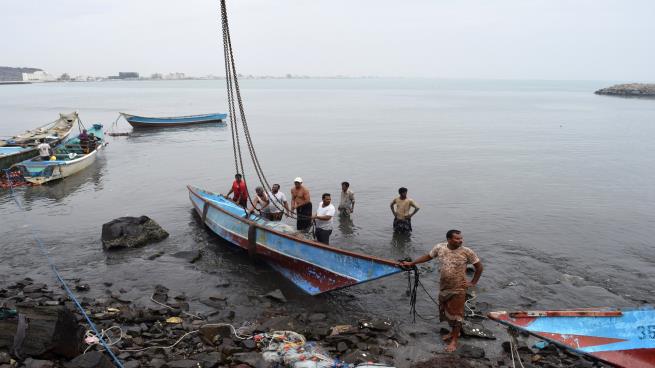Fishermen in Yemen confront the US-Saudi dangers to feed their families
YemenExtra
Catching fish for a living in Yemen isn’t only about jumping in a boat and throwing a net into the sea. You need to also say goodbye to your family and prepare them for the fact that they might never see you again.
Because what was once a fairly routine occupation has, since war started in 2014, often become a matter of life and death.
This has little to do with storms or treacherous currents at sea, but rather the fact that after the Saudi-led coalition declared most of Yemen’s territorial waters a conflict zone, fishermen have frequently been fired upon and killed when attempting to work there.
As of August 2019, at least 334 fishermen had been reported killed or injured since 2015, according to statistics from Yemen’s fisheries authority. Others had been arrested and had their boats seized, while some were now detained in Saudi-run prisons in Yemen.
“We are allowed to fish in specific areas near to the beach,” Ahmed Futaih, a fisherman in his 40s from Aden city, told Middle East Eye.
“But when we try to fish in deeper areas, where there are a lot of fish, Apache helicopters chase us and the fighters shoot at us or their military boats arrest us and seize our boats.
“One of my colleagues was arrested by the Saudi-led coalition and they seized his boat. They only released him after he signed papers saying that he would not fish in the banned areas again.”
Local reports estimate that of Yemen’s approximate 100,000 fishermen, since 2015 over a third (37,000) have quit and thus lost their income.
This is one of the world’s poorest countries, where the war has resulted in tens of thousands of people living in famine-like conditions and which has been declared by the United Nations as the world’s worst humanitarian crisis.
Driven further out to sea
Desperate to continue earning a living and feeding their family, some fishermen, such as Futaih, have been forced to go out far beyond Yemen’s territorial waters and head for Somalia, where there are plentiful fish stocks.
There they are safe from the coalition’s bullets and punishment, but not from other hazards.
“Many fishermen decided not to continue in this dangerous job and they went to look for an alternative,” Futaih told MEE. “But I don’t have any other profession to help me to provide for my 11 family members.
‘Otherwise I will starve to death’
Malik, a fisherman who inherited this job from his father, told MEE that while Yemen’s waters may not be safe to fish in for Yemenis in small boats using traditional methods, large commercial fishing vessels from the Gulf states were trawling for fish every day.
“It isn’t safe for us who fish in the traditional way to fish in Yemen, but the Emirati and Saudi fishing vessels are allowed to dredge our fish from anywhere they want,” Malik said.
Malik was arrested by the Somali coast guard and released last year after they had seized his boat and he’d paid a fine to Somali authorities.
“I don’t have a boat now, but I hire one and sail to fish in Yemeni waters or near Somalia’s waters,” Malik told MEE. “That’s my only choice, otherwise I will starve to death together with my wife and three children.”
Yasmin Mohammed, from Aden, told MEE that she used to cook fish every day in the family home. It was such a staple in the family’s diet that her children would sometimes ask her for a break from it.
“Fish used to be very cheap and most families in Aden could easily afford it. But since 2015 prices have been increasing and it is now unaffordable,” she said. “Fish that used to cost 1,000 ($4) Yemeni riyal now costs YR10,000 ($40).”
Yasmin, a widow providing for four children, said that she hardly buys fish anymore as only rich families can afford it.
Saeed, a fisherman from Aden’s waterfront Sira district, said that fish prices had risen dramatically because of the increasing dangers and challenges that Yemini fishermen now face.
Source: Middle East Eye

